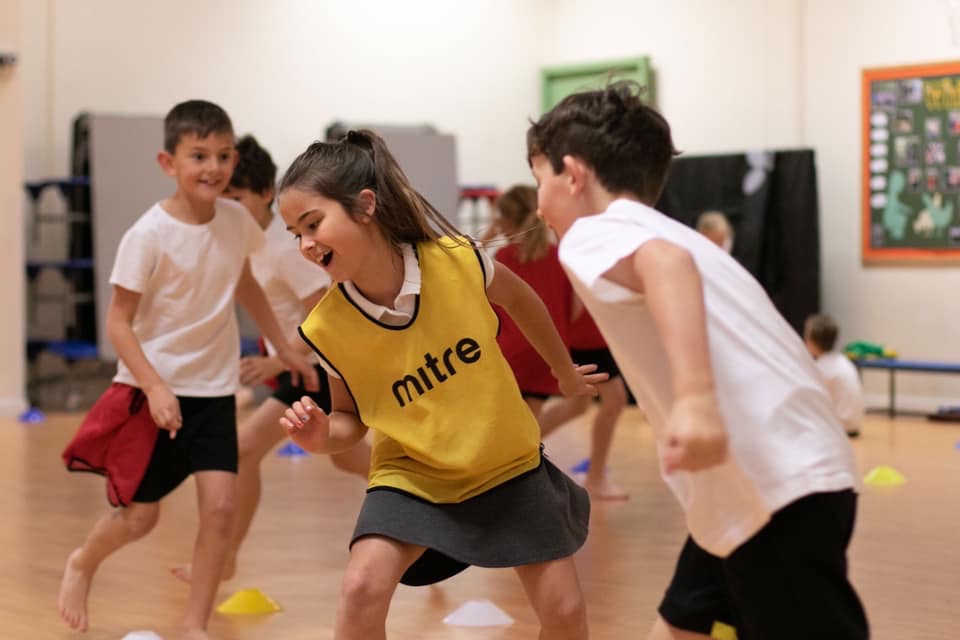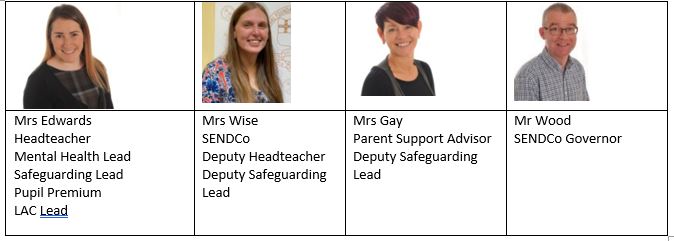
The EllisChurch Of England Primary School
SEND
‘Be The Best You Can Be’
” For I know the plans I have for you, “says the Lord. “They are plans for good and not for disaster, to give you a future and a hope” Jerimiah 29:11
The Ellis CE Primary School SEND Information Report
Welcome to our Special Educational Needs and Disability (SEND) Information report. We hope that you will find the following information useful in helping you to understand the variety of ways we are able to support your child at The Ellis. Through these pages, we aim to explain how we will support your child to enable them to reach their full potential during their time with us as we prepare them for their transition into adult life and give them the opportunities to ‘be the best they can be’. We are keen to work with you in supporting your child and we welcome you into school to discuss your child’s needs with us. Please do not hesitate to contact myself, your child’s class teacher or a member of our inclusion team.
Mrs Wise, Special Educational Needs & Disabilities Coordinator (SENDCo)
Our inclusion team:
Introduction
The Ellis CE Primary School is an inclusive school and we believe that all children should enjoy their time with us, be valued, respected, loved and be given the opportunity to ‘be the best they can be’. We use our best endeavours to ensure that the provision for all pupils is of the highest possible standard, whilst acknowledging that we are continually striving to improve our practice. We are committed to narrowing the attainment gap between children with SEND and their peers, and are working to achieve this in a variety of different ways. Quality First Teaching is vital but we recognise that there are times when a child may need further additional support in order to help them achieve their targets.
Our School Aims are as follows:
- To create a secure and happy environment
- To meet the needs of all individuals
- To ensure high standards of both teaching and learning
- To encourage fulfilment of potential, recognise and celebrate achievements
- To meet the requirements of the EYFS and National Curriculum
- To provide a broad and balanced education to develop the whole child
- To encourage the children to be self-disciplined, caring and responsible towards others
- To promote positive self-esteem, confidence and independence
- To constantly reflect the Christian ethos of our school in our relationships with the children, their families and the wider community
What is a special educational need?
A child or young person has SEND if they have a learning difficulty or disability that calls for special educational provision to be made for them. A child of compulsory school age or a young person has a learning difficulty or disability if they:
(a) Have a significantly greater difficulty in learning than the majority of others of the same age; or
(b) Have a disability that prevents or hinders them from making use of educational facilities of a kind generally provided for others of the same age in mainstream schools or mainstream post -16 institutions.
A child under compulsory school age has special educational needs if they fall within the definition at (a) or (b) above or would do so if special educational provision was not made for them (Clause 20 Children and Families Act)’ (SEND Code of Practice 2015).
What is a disability?
The Equality Act 2010 states that a person has a disability if they have a physical or mental impairment and the impairment has a substantial and long-term adverse effect on their ability to carry out normal day-to-day activities.
A physical or mental impairment includes: learning difficulties including specific learning difficulties; medical conditions including epilepsy, diabetes, more severe forms of asthma and eczema, autism, speech, language and communication impairments.
If the impairment has a substantial and long-term effect on a person’s ability to carry out normal day-to-day activities it may amount to a disability.
Areas of Special Educational Need and Disabilities
The SEND Code of Practice (2014) states that there are four broad areas of need when looking at identifying the needs of children and young people with SEND. Through discussions with parents, the child and class teachers, an area of need will be identified so that the correct support can be targeted.
Communication and Interaction (C&I)
Children with Speech, Language and Communication needs (SLCN) have difficulty communicating with others and may also not understand and use social rules of communication. This often includes children with Autistic Spectrum Disorder (ASD).
Cognition and Learning (C&L)
Cognition and Learning difficulties cover a wide range of needs, including moderate learning difficulties (MLD) and severe learning difficulties (SLD), where children are likely to need support in all areas of the curriculum. Specific learning difficulties (SpLD) affect one or more specific aspects of learning which could encompass a wide range of conditions such as dyslexia, dyscalculia and dyspraxia (developmental coordination disorder or DCD).
Social, Emotional and Mental Health Difficulties (SEMH)
Children with Social, Emotional and Mental Health issues may experience a wide range of difficulties. These may include becoming withdrawn or isolated as well as displaying challenging, disruptive or disturbing behaviour. Other children may have disorders such as Attention Deficit Disorder (ADD), Attention Deficit Hyperactivity Disorder (ADHD) or Attachment Disorder.
Sensory and/or Physical Impairment.
This area of need includes visual impairments, hearing impairments, or multi-sensory impairment, which will require specialist support and/or equipment to access their learning. Some children with a physical disability require ongoing support and equipment to access all opportunities available to their peers.
What should I do if I think my child has special needs or a disability?
If you feel that your child may have SEND then you should ask to speak to your child’s class teacher in the first instance. If they are unable to see you straight away, they will be happy to make an appointment when you can discuss your concerns in more detail. Your child’s class teacher may also feel that it would be helpful to have the SENDCo attend the meeting. The school monitors all children closely and offers support if barriers are being experienced in school and at the meeting we may feel that we need to put in place some strategies and interventions to minimise or overcome your child’s barriers to learning. Similarly, if a teacher has concerns about your child and their progress, you will be invited to school by the teacher to discuss this.
For some children this may not be enough to help them make expected progress and they may need something which is ‘additional to and different from’ that which is normally provided for all children. If a child requires this type of support, the School will monitor them according to the SEND Code of Practice. This could mean that the class teacher may use different strategies to help your child learn, or perhaps your child will receive some additional support in a small group alongside other children with similar needs.
However, for some children this still may not be enough and the school, with your agreement, will make the decision to increase the level of support provided. This means that the school will decide to involve external professionals or agencies to provide them with more specialist advice and guidance. This external support might be from an Educational Psychologist; Speech and Language Therapist; Occupational / Physiotherapist; Social, Communication and Interaction Team; Specialist Advisory Teacher; 0-19 services; Targeted Support; or a medical professional. If your child’s needs are wide ranging or more complex, then it may involve several of these people who will need to work in a co-ordinated way.
At The Ellis we use a secure system called CPOMS (Child Protection Online Management System). In order to ensure we have full and relevant information around your child’s needs, we will keep a log of information on our CPOMS system. Where we have concerns around your child’s needs we will log discussions that we have with you as parents/carers, as well as uploading documents and reports received from outside support agencies. This ensures we build a succinct timeline of events as well as having all reports readily available to share with further agencies, with your written permission, when required.
What is an Early Help Assessment (EHA)?
An EHA can be initiated by any professional (e.g. Doctor, Health Visitor, School) who comes into contact with your child in order to support the child and the family with specific needs. These needs may be social or medical needs as well as educational. Therefore, it is possible to have an EHA without being on the SEND register. However, many children who are on the SEND register do not need an EHA. An EHA is the means by which access to a wider range of support from professionals is gained or the support already in place is brought together in one coordinated place. Once established, the EHA will lead to regular Team Around the Family Meetings (TAF Meetings) where everyone involved with your child (including yourself) can sit down together and discuss the best way to help your child make progress. Once all professionals and the parents agree that the objectives in the EHA have been met then the EHA can be closed. There are some referrals to outside agencies where an EHA is a prerequisite to accessing assessment and services.
What is the SEND register and how is it used?
If, through joint discussions, it is decided that your child is needing ‘additional and different to’ support in order to make progress, or if an ongoing barrier to learning and participation is identified, then they will be moved to the SEND register. The SEND register is a document that indicates which children across school are considered to have SEND. It enables the school to carefully track these children as they go through school. You will be involved in the decision to add your child to the SEND register and will be kept updated about your child’s progress on a termly basis through the use of a School Support Plan (SSP). In some instances children are able to catch up with their peers and begin to make good progress. In these cases, your child can be subsequently taken off the SEND register.
What is a School Support Plan (SSP)?
A School Support Plan is a plan that is written by the class teacher in consultation with the parent and child. The majority of children on the SEND register will have an SSP, with a small number of children having a Learner Profile instead. The SSP records the personalised targets a pupil is working towards, the additional and more specialised strategies and interventions that will be required to help reduce/manage the barriers to your child’s learning. Contributions from parents and children towards new targets are an important part of developing an SSP. Therefore, families are invited to school termly to discuss SSPs.
What is an Education Health and Care Plan (EHCP)?
Some children require support of an additional nature beyond those mentioned above. If this is the case, then the SENDCo may discuss with you the possibility of asking the Local Authority to undertake a statutory assessment of your child’s needs. If this is considered appropriate, then the school will gather information to count as evidence to support the school’s view that your child’s needs are such that they need additional support. Information gathering includes collecting data and reports from the full range of professionals that are involved with your child. With your permission, all of the information gathered will then be sent to the Local Authority for them to consider the information at a panel meeting. Then a decision will be made about whether or not to carry out a statutory assessment of your child’s needs. Whilst this is taking place, the School will continue to support your child’s needs with the resources that are already in place. As a parent/carer, you also have a right to initiate a request for assessment for an EHCP.
Once the Local Authority receives a request to consider a statutory assessment, a legal timescale begins. The process of statutory assessment is carefully bound by the legislation and guidance within the SEND Code of Practice. The SENDCo will be able to explain the process and timescales to you. If the decision is made to go ahead with a statutory assessment, then the Local Authority will signpost you to guidance and support that will assist you through the process, for example from the Special Educational Needs and Disabilities, Information, Advice and Support Service (SENDIASS).
Once the statutory assessment process is completed, you will be sent a copy of your child’s draft EHCP. An Education Health and Care Plan is the name of the document that outlines the educational and health care needs of a child, once agreed by the Local Authority. An EHCP addresses needs that are both educational and health or medical related. These are designed to address complex needs in a coordinated way, to ensure that all needs are met within an educational/health care setting.
An EHCP monitoring document would then be put in place in school in order to break down the targets outlined within the EHCP into small steps and this would be the working document used to support your child in class.
What can I expect The Ellis to be doing, in order to meet my child’s Special Educational Needs?
‘Quality First Teaching’ is an entitlement for all children and we are constantly striving to ensure that this is of a ‘good’ or ‘outstanding’ quality at all times in school. This is the classroom teaching that your child receives on a daily basis from the class teacher. Flexible groupings are used at The Ellis and children will be supported by a wide range of staff within their class team. Lessons are carefully adapted to take into account the different learning styles and abilities. Teaching and learning is targeted to meet individual need and scaffolding for learning will be put in place to support learning where needed. This is called personalised learning.
Where appropriate, children may have access to additional small group activities for short periods of time alongside other children with similar needs. This may be to undertake work on particular intervention programmes or simply as a means of facilitating opportunities to revisit skills, or knowledge where they may need additional practise or over-learning. The work carried out in small groups is overseen by the class teacher who is responsible for monitoring the child’s progress and targeting the support carefully.
The school currently has the following group interventions available for children;
- ELKLAN
- NELI
- WELCOMM
- Socially Speaking
- Music Therapy
- Motional
- Lego club/Lego Therapy
- Jump Ahead
- Small group comprehension
- Hold a sentence groups
- Spelling Zappers
- Maths Catch up
- Social Stories
- Comic strip conversations
- Write from the Start
- Big A
- Zones of Regulation
- The Anger Gremlin
- Forest School
- 1:1 RWInc tutoring
- RWInc Fresh Start
However, if a child needed something outside of these interventions, then this would be considered. Some children may require interventions of a 1:1 nature for very short periods of time. Again, these are overseen by the class teacher and progress is carefully monitored.
How will my child’s learning needs be assessed and their progress monitored?
The Ellis has a rigorous programme for assessing children’s learning. Some assessment takes place at the end of specific pieces of work to inform teacher’s planning of the children’s next steps in learning. Also, on-going assessments take place on a daily/regular basis to ensure that the opportunities presented to children are appropriate and give them the chance to succeed. The same systems and procedures are in place for children with special educational needs. In some instances, additional assessments may be appropriate for children with special educational needs, in order to provide additional information to determine their strengths and areas for development. If your child is not accessing the National Curriculum, then they will be assessed using more personalised, small steps. However, if it is felt that something more specialised is required, then the relevant service could be contacted to discuss this. At the end of each Key Stage (i.e. Year 2 and Year 6) all children are required to be formally assessed using Standard Assessment Tests (SATs). This is something that the Government requires all schools to do and the results are published nationally at the end of each academic year. All pupils at The Ellis who are identified as having a Special Educational Need or disability have a School Support Plan (SSP). Aspirational targets are set for all children and the plans are shared with children so that they are aware of what they need to learn next. Children with special educational needs are aware of their educational outcomes and where relevant, engaged in the discussions relating to how much progress they feel they have made. Parents and Carers are invited to the reviews of SSPs, and their contribution to the setting of new targets is welcomed and encouraged. Once a new plan has been written school will carefully monitor the progress being made. If it is felt that, for any reason, the outcomes are inappropriate, school will discuss more appropriate outcomes with parents at the earliest opportunity, rather than waiting for an inappropriate plan to run its full course. In addition, the progress of children with an EHC Plan is formally reviewed at an Annual Review meeting with all the adults involved with the child’s education.
What training and expertise do staff have in supporting children with SEND?
At The Ellis we are proud of the experienced, knowledgeable and caring support that our staff are able to offer children with SEND. Many of our staff have a wealth of experience of helping to provide learning opportunities for children with a wide variety of complex needs. Staff are motivated and eager to continue to access further training to deepen knowledge and extend skills where and when necessary. Staff working with children with specific needs undergo training to provide them with the necessary tools to enable them to provide the best possible support.
Staff training includes:
- Thrive Approach
- Forest School
- Social Skills – Time to Talk, Social Stories and Lego Therapy
- ELKLAN
- Wellcomm
- NELI
- Jump Ahead
- Music Therapy
- Play Therapy
- Team Teach
- RWInc (including Fresh Start and 1:1 Tutoring)
- PECS
- Supporting independence
- Dyslexia
Where we identify that a child has a specific need, we will also seek out further training if needed to directly address their needs.
Mrs Wise has achieved the Postgraduate Certificate in Special Educational Needs Coordination – The National award for SEND Coordination.
How is the effectiveness of the School’s provision for children with special educational needs monitored?
The Ellis has a robust policy for special educational needs. The policy is implemented by all members of staff and its effectiveness is monitored and evaluated by the Governing Body on an annual basis. The SENDCo meets with the SEND Governor on a regular basis, enabling up to date general information on the progress of children with SEND and the provision made for them to be shared with the whole governing body. All interventions are recorded and evaluated as part of our Pupil Progress cycle. Personalised outcomes are identified for individual pupils on their SSP and the impact of this intervention is evaluated carefully throughout each term. Evidence of the impact is recorded for each pupil on their individual plan (SSP or EHCP monitoring plan). Families are invited to a SEND review meeting each term (Autumn, Spring and Summer) to review and evaluate the provision in place and to discuss future intervention, strategies and future courses of action. The effectiveness of provision is monitored regularly through data analysis which enables future actions and priorities to be identified. The school works with the Local Authority to continually review and improve SEND provision.
In our OFSTED report (November 2022) it was recognised the ‘All pupils, including those with special educational
needs and/or disabilities (SEND), are treated with dignity and respect’ and that ‘Leaders are keen to introduce new experiences to pupils, including pupils with SEND and those who may be vulnerable.’
External Support
External agencies are engaged where appropriate to provide additional support and guidance. Where external support is required, parental permission is always gained first, and reports shared highlighting the next steps in supporting your child’s specific needs.
The support provided could be from:
- Speech and Language Therapists (SALT)
- Educational Psychologists
- Positive Regard
- Occupational Therapists
- Physiotherapists
- Community Paediatrics
- Educational Welfare Officer
- Child and Adolescent Mental Heal Service (CAMHS) or COMPASS Be
- Social Services
- Social, Communication and Interaction Team (SCI)
How is the Ellis Primary school environment accessible to children with SEND?
The Ellis Primary School is a recently built school, which is on one level. Only minor adjustments are required based upon the needs of pupils. However, there may be times in which the footprint of the building may not favour all pupils. In such circumstances, we will consult with inclusion specialists to ensure that the environment is suitable for all learners and respond appropriately. In some circumstances, this may include a referral to alternative provision if this is in the best interest of the child.
What extra-curricular activities and educational visits will my SEND child be able to take part in?
At The Ellis we have a wide range of extra-curricular clubs. All children are welcome to come and any special provision that we will need to make in order for them to be accessible for your child will be discussed with you. Our clubs change on a regular basis so please watch out for letters to inform you and your child of what is available.
All children are included in our educational visits and residential trips and we work with pupils and families to agree any personalisation or additional support needed to make participation possible.
How will The Ellis support my child through moving class or school?
We understand that transitions can be difficult and traumatic for some children with SEND and take steps to support smooth transitions.
If your child is moving to another school or moving into year 7:
We will contact the school SENDCo and ensure they know about any special arrangements or support that needs to be made for your child prior to their arrival.
We will ensure that all records about your child are passed on quickly to their new school.
Wherever possible we arrange additional transition visits for children with SEND.
Where possible we will arrange further parent information visits.
When moving classes in school:
Transition meetings are held between the current and receiving classes to share all information related to the individual needs of your child and to set new targets for the coming term.
Children have visits to their new classrooms in July, to familiarise themselves with the environment and routines. Wherever possible, the adults who will be in the class in September are in place too.
Some children may also require extra visits to their new classroom. Where this is identified, we will share the extra times so that you can also support your child in the transition visits.
How will The Ellis support me, as a parent with a child with SEND?
At The Ellis we always have an open door policy for our families. You are welcome to have a quick, informal chat with your child’s class teacher before or after school. However, should you require a longer discussion, then we ask that you arrange a time directly with the class teacher, a member of the inclusion team or through the office. We are happy to discuss your child’s progress and any concerns you have. We are also keen to share strategies that work well with your child in school so that they can be used consistently at home too, if you would wish to do so. Mrs Wise, along with all members of our inclusion team are available to answer any further questions that you may have about your child’s needs. Within school, we can offer a range of support and services provided through school or from external agencies.
Barnsley Metropolitan Borough Council Local Offer
The purpose of the local offer is to enable parents and young people to see more clearly what services are available in their area and how to access them. It includes provision from birth to 25, across education, health and social care. BMBC Local Offer is available from these websites:
https://barnsley.cloud.servelec-synergy.com/Synergy/Local_Offer/























